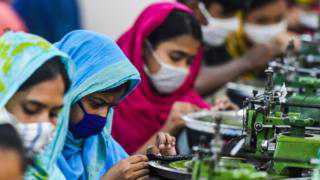Clothing makers in Asia offer stark coronavirus warning

Collected
"If our employees don't die from coronavirus, they'd die of starvation."
This can be a stark assessment of how the pandemic is impacting the clothing industry from garment factory owner, Vijay Mahtaney, the chairman of Ambattur Vogue India.
In normal occasions, Vijay Mahtaney and his partners Amit Mahtaney and Shawn Islam employ a total of 18,000 personnel in three countries - Bangladesh, India and Jordan. But the outbreak has pressured them to turn off a lot of the organization, with just one factory, in Dhaka, partially operational.
Coronavirus lockdowns aren't the only thing affecting their capability to pay their personnel. They say their main problem is unreasonable requirements from big clients - generally in the US and the UK.
"Some makes are showing a true good sense of partnership and higher level of ethics in trying to make sure at least enough cashflow to pay personnel," Amit Mahtaney, the chief executive of Tusker Apparel Jordan, told the BBC.
"But we've as well experienced requirements for cancellations for items that are prepared or are work happening, or discounts for exceptional payments and for goods in transit. Also, they are asking for a 30 to 120 day time extensions on previously agreed repayment terms."
Within an email obtained by the BBC, one US retailer has asked for a 30% discount "for all payables - current or order", including those already delivered.
The reason why they cite is to "complete this extraordinary period".
"Their attitude is among protecting only shareholder benefit without any regard to the garment worker, behaving in a hypocritical approach, showing complete disregard with their ethos of responsible sourcing," Vijay Mahtaney said.
"Brand give attention to share price, today means many of them don't possess money because of this rainy day, and are arriving at the weakest link in the supply chain, asking us to help them out if they could be trying to get a bailout from the government stimulus bundle," Vijay added.
It comes just as garment manufacturers have already been hit hard simply by two major issues related to coronavirus lockdowns.
The problems were only available in February when factories couldn't get the recycleables they needed from China, the world biggest exporter of textiles, which accounted for a few $118bn (£67bn) in 2018.
Then just as China's textile factories reopened in recent weeks - providing garment manufacturers hopes to getting operations back on track - demand collapsed just as merchants were forced to shut their doorways after governments around the world imposed lockdowns.
Crucial industry
China may be known as the factory of the globe, but when it involves dresses, Bangladesh, Indonesia, Cambodia, Vietnam and Myanmar play an evergrowing role.
"Garment making has been diversifying from China for around a decade due to China's large costs," according to Stanley Szeto of apparel maker Lever Style which supplies premium makes including Hugo Boss, Theory, Vince, and Coach, together with online brands like Bonobos, Stitch Fix and Everlane.
It implies that garment making is an essential industry for many of Asia's growing economies, with World Trade Group info showing that Bangladesh and Vietnam are between the world's four major exporters of attire. Bangladesh now accounts for 6.7% of market show, accompanied by Vietnam with 5.7%.
Bangladesh has a lot more than 4 million garment staff, and textile and apparel goods made up more than 90% of the country's exports this past year.
Cambodia and Sri Lanka also rely on the sector for a lot more than 60% of their exports, according to Sheng Lu at the University of Delaware's department of vogue and apparel studies.
The industry makes up about more than half of most developing jobs in Bangladesh, and 60% in Cambodia, with production being truly a particularly essential employer of women.
Associate Professor Lu thinks the coronavirus pandemic could look at countries such as Bangladesh, Vietnam, Cambodia and India cutting between 4% to 9% of garment sector jobs.
That's partly why the Bangladeshi federal government is trying to greatly help the industry.
"It offers offered a good generous stimulus bundle to subsidise wages, convert loans to long-term credit debt and provide very reasonable interest levels," said Shawn Islam, managing director of Sparrow Clothing Bangladesh. "While it isn't enough to weather the storm, it will help."
The Cambodian government has also announced tax holidays for textile factories and proposed a wage subsidy scheme for workers.
That is because this outbreak could lead to a longer term influence like labour shortages, selling price increases of recycleables and too little production capacity, said Associate Professor Lu.
Soon after growing criticism and pressure, most brands including H&M and Zara-owner Inditex have committed to paying completely for existing orders from clothing manufacturers.
"Brands have profited for many years from producing found in low wage countries without community security systems and also have in many circumstances built up enormous empires through this business design," said Dominique Muller of Labour Behind the Label. "Years of exploitation must nowadays be repaid to treatment for their employees."
Factory owner Amit Mahtaney agrees.
"Vendors have to help you. Richer governments' bailouts of the sector are also essential," he said.
Without it, he claims, the industry could possibly be wiped out completely.
Source: https://www.google.com
Tags :
Previous Story
- COVID-19 shutdown: Airlines in Bangladesh counting huge losses
- Apple Launches New 'Today at Apple (in the...
- Samsung rising moves deep on corruption, chaebols, and...
- BCTDA outlines COVID-19 tourism impacts, response
- Coronavirus hits jobs, thousands face unemployment and poverty
- RMG factory closure extended till April 25
- British good trade group boils down heavily in...
- China ready to send more help to Bangladesh...